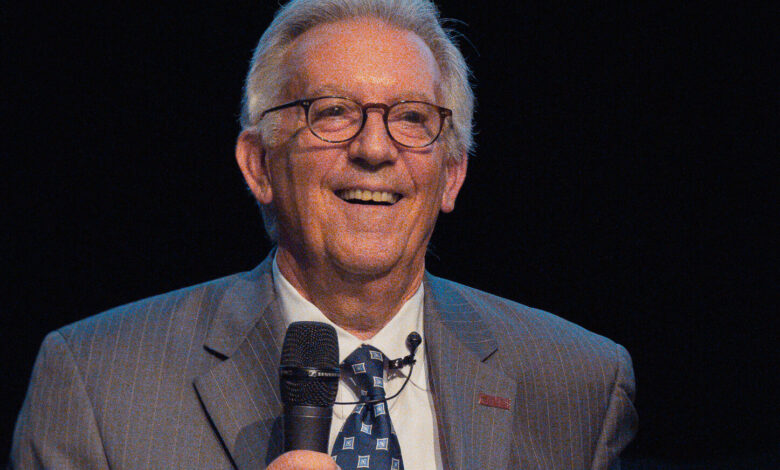
New university model introduced at convocation
By Hannah Newman
Rider’s staff and faculty convocation on Aug. 29 shed light on the university’s current budget deficits and decreasing enrollment numbers, prompting Rider President Gregory Dell’Omo to plan for a new university model that must be smaller and more nimble.
“Higher education is at a crossroads and we face difficult decisions that will shape the future of our institution,” said Dell’Omo. “We don’t have the luxury of time to go through this process.”
The new plan involves building budgets based on smaller enrollments, developing high-demand programs efficiently and supplying the resources to maintain a Division I athletics program. This program is based on a regional cost structure under the new NCAA model, which is still being rapidly adjusted, according to the presentation.
“What we need to do is create a new university model based on smaller enrollment rates, talented students, one that is neater in operations and more nimble in its ability to adapt to change,” said Dell’Omo.
Budget deficits
Rider’s operating deficit went from $17.1 million in fiscal 2023 to $10.2 million in fiscal 2024, a decrease of $6.9 million, as mentioned during the convocation. The university projects a $7.5 million deficit in the current fiscal year. The deficit remains a concern as Dell’Omo hopes to stay on track with “The Path Forward” plan and get the university back to a positive revenue stream by fiscal 2026.
To chip away at the remaining $10.2 million deficit, 31 staff positions were eliminated over the summer, saving Rider just over $2 million, Dell’Omo said in a webinar on July 30.
The deficit is due in part to declines in enrollment and housing revenue. On-campus occupancy stands at 1,711 as of Aug. 28, but this total is still distant from its pre-pandemic total of nearly 2,000, according to the presentation.
To bolster these numbers, Dell’Omo stated that, starting in fall 2025, Rider freshmen will be required to live on campus for the first two years.
Rider’s overall enrollment projections were negatively impacted by the eight-month, nationwide delay of the Free Application for Federal Student Aid, which was another focus of the staff and faculty convocation. FAFSA filings went down 13.6% nationally and 12% at Rider for fall 2024, according to enrollment data in Dell’Omo’s presentation.
The full-time equivalent headcount as of Aug. 28 is 3,648, which is 58 students below the projected fall 2024 total as well as a decline of 83 students from fall 2023. The incoming freshman class numbered 748, down from 804 the previous year. The ongoing complications with the FAFSA have caused a decline in low-income, high-minority and first-generation students, Dell’Omo said.
Rider applicants were down Latino -9%, Black -8%, Asian -19% and white -13% according to the presentation slides.
Dell’Omo expressed concern that the university might miss out on high-achieving students due to financial barriers, which motivated the university to create the Rider Tuition Guarantee, a new opportunity beginning in fall 2025 that can give students free tuition if they meet a certain set of criteria: they must have at least a 3.5 GPA, maintain a household income of $50,000 or less and must qualify for the Federal Pell Grant and the New Jersey Tuition Aid Grant.
“We did a smaller pilot of this for our transfer students, and we want to explore how we can do this for not just transfer students but freshman,” said Dell’Omo.
AAUP responds
Dell’Omo explained that the administration will revisit the academic viability of certain programs at Rider again, possibly leading to cuts in an effort to condense university projects.
Using Dell’Omo’s program reevaluations to formulate a new, smaller Rider, Quinn Cunningham, president of Rider’s chapter of the American Association of University Professors, voiced a shared concern within the union that faculty is not as involved as they would like to be in the decision-making process.
“One of the faculty members in the audience asked a question that we probably all immediately thought of which is, ‘why are there no faculty members on this taskforce,’” said Cunnningham. “I think most faculty feel like we should be involved from the beginning when talking about changes that are going to directly impact us and what we bring to our students.”
Cunningham noted that Rider is not alone in some of its issues, as many other institutions face new challenges in the post-pandemic higher education landscape.
“I think a lot of schools like ours are struggling. It’s just the environment that high education is in politically,” said Cunningham. “There’s a lot of anti-higher-education rhetoric going on so I would think that doesn’t help either.”
However, Cunningham expressed frustration with Rider’s operations in particular, as she feels the university’s mishandling of resources dates past 2020.
Cunningham said, “From the faculty point of view, the fact that Rider is in the state that we are in goes back before the pandemic. We believe there was [prior] mismanagement and the pandemic just accelerated how much it hurt.”
Dell’Omo did not detail any future plans for the sale of the former Westminster Choir College campus in Princeton. However, he noted that long-standing litigation over the proposed property sale is moving in the right direction.


